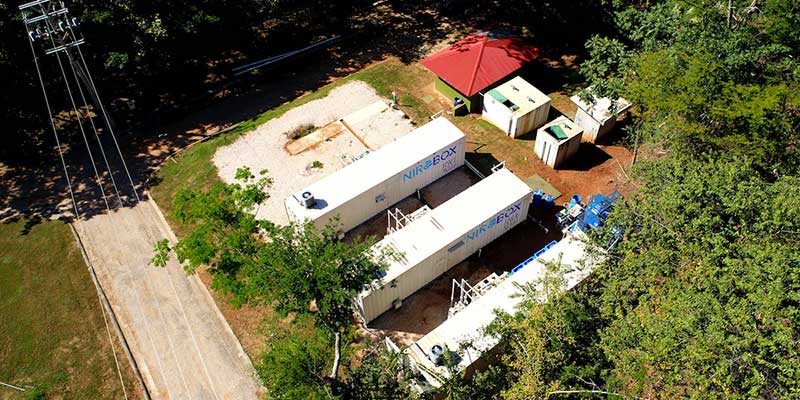
At a remote resort in Costa Rica, a NIROBOX™ seawater desalination plant supplies the needs of the resort without disturbing guests or wildlife.
With a focus on sustainability and local control, decentralized water and wastewater treatment offer a high degree of efficiency
Decentralized treatment simply means siting scaled water or wastewater treatment adjacent to supply, need, or both if possible. Decentralization has long been an attractive treatment strategy, but gaps in technology and engineering have limited its spread.
In conventional, centralized treatment, one of the most expensive aspects is establishing the cost of pipeline construction to serve outlying areas, so remote communities often have been left without service. Siting treatment plants exactly where they are needed has reduced the financial burden of providing such areas with service. And with new advances in compact wastewater treatment and desalination, economies of scale are no longer required to achieve cost-efficiency.
In one case, officials in central China were tasked with finding a wastewater treatment solution for Hubei province’s highway service areas, which are spaced at 50 km intervals along a highway system that runs mostly through rural, agricultural, and eco-tourism areas. With 80 such plants planned, the use of decentralized treatment presents great savings over the cost of tying treatment to a central plant.
Aspiral™ Smart Packaged plants from Fluence are being used for the project. Because of Aspiral’s high-quality effluent, which meets China’s strict Class 1A standard, treated wastewater from the service areas is released locally, contributing to water quality in the province, a boon to both nearby rice farmers and to tourist attractions like the floating fields of lotus blossoms on Honghu Lake. Aspiral also meets California’s Title 22 standards for reuse.
Agility of Fluence Decentralized Treatment
The mobility, speed, scalability, and versatility of Fluence decentralized treatment solutions add up to agility.
- Mobility: Aspiral MABR-based wastewater treatment units and NIROBOX™ reverse-osmosis units for desalination and other applications are plug-and-play, and are packaged in steel shipping containers for quick delivery anywhere in the world. If conditions change, units can be moved to different service areas or sold.
Example: Because the Hubei service areas are on a highway, 40-foot Fluence L4 Aspiral wastewater treatment units are being trucked in directly on flatbeds.
- Speed: The mobility of Smart Packaged treatment means fast turnaround between ordering and commissioning. Fluence can deliver Nirobox desalination units in as little as two months, with only minimal site preparation and construction needed. The units’ durable, weatherized steel shipping containers are the building that houses treatment processes, and the units arrive engineered and customized to hit the ground running.
Example: Fluence delivered three Nirobox SWRO units by ship to the island of Mayotte in the Indian Ocean between Madagascar and Mozambique, with only two months between order and delivery.
- Scalability: With the unpredictability of climate change, Smart Packaged units allow you to react to changing conditions with unprecedented speed and control. Plants can be scaled up by simply piggybacking more units, or scaled down by decommissioning units, redeploying them to other locations or selling them.
- Versatility: Fluence containerized units operate under a wide range of conditions. For instance, the unparalleled energy efficiency of Aspiral’s MABR-based treatment means they can be operated with alternative energy sources in off-grid locations. Each unit is custom-built for a site’s specific source water, and quality targets. Their small footprint and low-noise, low-odor operation make them good neighbors, from close urban quarters to remote areas where pristine natural aesthetics are key.
Example: The Reserva Conchal resort in Costa Rica has a remote beach-and-jungle location that makes it as stunning as it is difficult to supply with fresh water. But three Fluence Nirobox desalination units, installed out of sight on a small plot, supply the entire resort without disturbing guests or local wildlife.
Decentralized Treatment Efficiency:
Fluence decentralized plants offer:
- Lower energy requirements on a smaller footprint, enabling off-grid operation on alternative energy sources
- The convenience of low maintenance requirements, automation, and remote monitoring
Overcoming Political Challenges
Smaller-scale projects may eliminate politically challenging negotiations across diverse regions and facilitate local control of community water treatment systems. For example, rivers including the Nile, Ganges-Brahmaputra, Indus, Tigris-Euphrates, and Colorado all have been identified as potential hotspots for water disputes, with the potential for both problems and solutions continuing to the county, metropolitan, and even neighborhood levels.
For instance, in Jakarta, the capital of Indonesia, illegal water wells are continually being drilled. There is no comprehensive, citywide drinking water and sanitation solution, leading to friction between Islamic extremists, secular Indonesians, Muslims, and ethnic Chinese factions. Cobbling together a citywide consensus might be impossible, but theoretically, even a single district on the Java Sea could establish decentralized desalination and wastewater treatment to ensure a local supply.
Commercial Applications of Decentralized Treatment
Decentralized treatment can help a business maximize its sustainability. For instance, a commercial campus can reduce its water consumption by reusing wastewater for landscape irrigation, flushing toilets, other nonpotable applications. By reducing energy consumption and the load on municipal wastewater treatment, decentralized MABR treatment and reuse make sense economically, ecologically, and socially. In some cases, a business can even be in a position to share resources with surrounding communities.
Remote work camps can benefit from decentralized treatment. Desalination and WWT needs can be met for as long as necessary, then Smart Packaged units can be sold or easily relocated.
With an ever-increasing belief that decentralized treatment is the strategy of the future, science and engineering are catching up with need. Contact Fluence for more information on the technology and the financing models that can make decentralization work for you.
